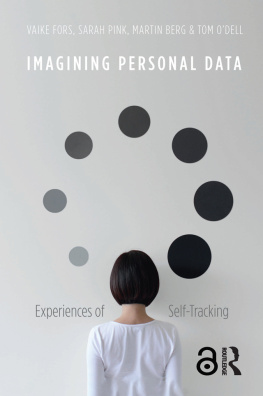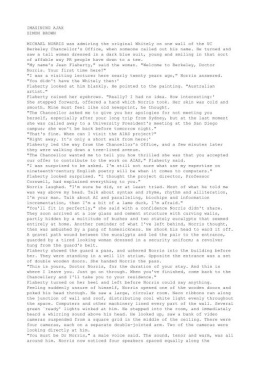Imagining Personal Data
Imagining Personal Data
Experiences of Self-Tracking
Vaike Fors, Sarah Pink, Martin Berg and Tom O'Dell
First published 2020 by Bloomsbury Academic
Published 2020 by Routledge
2 Park Square, Milton Park, Abingdon, Oxon OX14 4RN
605 Third Avenue, New York, NY 10017
Routledge is an imprint of the Taylor & Francis Group, an informa business
Copyright Vaike Fors, Sarah Pink, Martin Berg and Tom O'Dell, 2020
Vaike Fors, Sarah Pink, Martin Berg and Tom O'Dell have asserted their right under the Copyright, Designs and Patents Act, 1988, to be identified as Authors of this work.
For legal purposes the Acknowledgements on p. viii constitute an extension of this copyright page.
Cover design by Tjaa Krivec
Cover image pchyburrs/Getty Images
The Open Access version of this book, available at www.taylorfrancis.com, has been made available under a Creative Commons Attribution-Non Commercial-No Derivatives 4.0 license.
Notice:
Product or corporate names may be trademarks or registered trademarks, and are used only for identification and explanation without intent to infringe.
A catalogue record for this book is available from the British Library.
A catalog record for this book is available from the Library of Congress.
ISBN13: 978-1-3500-5138-6 (hbk)
Typeset by Integra Software Services Pvt Ltd.
This book is the outcome of collective research in which all four authors participated, playing out particular roles in relation to our different research interests and expertise. Without this collaboration the book that has resulted would have been impossible for any of us as a sole author endeavour, and we are grateful to each other, the Swedish Foundation for Humanities and Social Sciences (Riksbankens Jubileumsfond), who funded our research, and to our respective universities for the opportunity and support they provided. We similarly thank the many people who have supported our project as research participants, giving us their valuable time to discuss and show their uses of self-tracking technologies and personal data. We have represented those who chose this option with their first names in this book, others have pseudonyms according to their wishes and our research ethics. Without their enthusiasm for our project, likewise this book would have been impossible.
While we are the authors of the text presented here we also acknowledge the contributions that others have made to our research and thinking. We would like to thank Shanti Sumartojo, who undertook fieldwork discussed in , within a cycling and self-tracking study undertaken collaboratively with Sarah Pink, Deborah Lupton and Christine Heyes LaBond. Deborah Lupton also gave valuable input to the conclusions in the same chapter. We also thank participants in the Data Ethnographies workshop series, based at RMIT University while Sarah Pink worked there, particularly Robert Willim, Melisa Duque, Dbora Lanzeni, Elisenda Ardvol and Francesco Lapenta, who participated in our Broken Data workshop. We also had valuable discussions of our research with our colleagues within the international Self-tracking and automatised bodies network, funded by the Swedish Foundation for Humanities and Social Sciences, and led by Martin Berg, in particular Deborah Lupton, Minna Ruckenstein and Mika Pantzar. A special thanks goes to Minna Ruckenstein, who has been very helpful in discussions about the foundations and futures of the Quantified Self community and other similar phenomena, and for putting us in contact with one of the leading figures of the Finnish BioHacker community, Teemu Arina. Jonnie Eriksson helped us to clarify philosophical underpinnings of biohacking and the traces of transhumanism in contemporary self-tracking practices.
We also want to thank Thomas Blomseth Christiansen, Jakob Eg Larsen and Sara Riggare, who generously shared their thoughts about the future of self-tracking, based on their own extensive self-tracking experiences, their long-term engagement in the Quantified Self community and their own academic research. Likewise we thank Kourosh Kalantar-Zadeh and Chris Dancy for taking the time to discuss their individual projects with us. We also received inspiring input from the Future Self-Tracking workshop we organized at Halmstad University on 24 November 2017. This interdisciplinary workshop with researchers, developers and designers was facilitated by Pontus Wrnesthl, and Thomas Blomseth Christiansen, Jakob Eg Larsen, Kalle Jonasson, Susanne Lindberg, Thomas Lindgren, Jesper Lund, Lina Lundgren, Jens Lundstrm, Carljohan Orre, Wagner Ourique de Morais, Anita SantAnna and Rachel Charlotte Smith were invited participants.
Confessions of a novice self-tracking research team
The production of personal data through digital self-tracking involves people using and engaging creatively and analytically with wearable, digital, mobile and locative sensor and computing technologies to record data and quantify and analyse various aspects of human activity. This includes walking, running, cycling and other forms of movement, heart rate, sleep, calorie intake and expenditure, stress levels and much more. The origins of the rise of digital self-tracking lie in the commitment to the measurement, monitoring and sharing of personal data in self-experimenting communities that indulge in technology-oriented do-it-yourself biology, such as biohackers and the Quantified Self members. In recent years self-tracking has become ubiquitous in everyday life contexts as well as being tested and used to varying degrees of success in wider settings, for example, health, educational programmes, efficiency management in work life, in the management of personal relationships, in postnatal care, and in caring for and tracking the movements of pets.
But what happens in the wake of the hype, when ordinary people take on the project of digital self-tracking in their everyday lives? How do their uses, expectations and imaginaries relate to the history of self-tracking, to the ideas that underpin the development and design of contemporary self-tracking devices and apps, and to how early adopters in self-tracking communities and top-end researchers imagine future self-tracking?
As Teemu Arina, a leading figure in the Finnish biohacking community said regarding self-tracking in the context of biohacking at the 2015 Biohacker Summit in Helsinki:
You might have a hypothesis if I do that, that will happen. But you dont know until you try. I might have a scientific understanding of it, in research papers they might ask different kind of experts, but really you dont know until you test. (Arina, quoted in Berg, Fors and Eriksson 2016: 115)
Our work as researchers is always inflected by our own personal lives, and in the following chapters we examine the personal as it intersects with data and technology. As we started our research we realized that we likewise needed to know more about how personal data felt, and what it would feel like when it was no longer so personal but was shared with others. In this prologue, we ask: what could a group of researchers learn and know about themselves by collectively using self-tracking devices in their ordinary everyday lives? And what might readers want to know about them before considering their interpretation of how other people live and imagine their futures with data?












